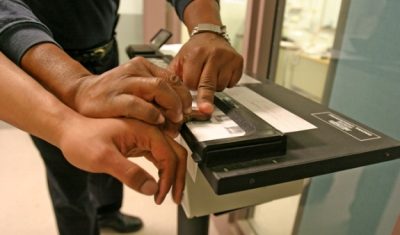Immigration at the Border

Are the Wheels Falling Off DHS’s Immigration Enforcement Wagon?
Over the last few weeks, DHS Secretary Janet Napolitano has been on an enforcement tour defending the Administration’s record on border enforcement while criticizing conservative lawmakers’ “enforcement-first” legislative strategy (Napolitano has repeated called on lawmakers to stop “moving the goal posts”). Calling out legislators for using the border as an excuse to stall immigration reform is important, but maybe Secretary Napolitano should take a serious look at the egregious enforcement actions taking place right under her nose. Yesterday in Michigan, ICE agents apparently followed immigrants from their homes to a nearby elementary school where they were dropping off their children. Read More

Restrictionist Group Blames the Children of Immigrants for America’s Budget Woes
The Center for Immigration Studies (CIS) released another report today attempting to blame our economic woes and budget shortfalls on immigrants—this time using the children of immigrants, most of whom are U.S. citizens, as scapegoats for benefits usage (here Medicaid, food assistance, cash assistance, and housing programs). As are most restrictionists’ attempts to blame immigrants for all of America’s problems, the report is rife with methodological problems. Despite the headline that 57 percent of households headed by an immigrant with children used at least one benefits program, compared to 39 percent for native households, the results actually show that when controlled for income, immigrant households use benefits at the same rate as native born households. Read More

Secure Communities Program Continues to Take Heat for Targeting Non-Criminals
At a conference last week, DHS Secretary Janet Napolitano raised a few eyebrows when she implied those who are fingerprinted through ICE’s Secure Communities program are presumably guilty of a crime—a particular sticking point considering the program’s reputation for sweeping up non-criminals. Although ICE officials claim the program targets criminal aliens, nearly 28% of people deported through the Secure Communities program are actually non-criminals. But that’s just one of the many problems immigrant advocate and community groups are voicing over this rapidly expanding program. Read More

Yet Another State Leaves Immigration Enforcement Bill on Cutting Room Floor
The legislative graveyard got a little bit bigger this week as lawmakers in Mississippi pronounced a series of restrictive immigration measures dead. More than 30 immigration-related bills—including an Arizona-style enforcement bill—failed to meet a legislative deadline due to disagreements over the laws’ impact on the business community. Mississippi joins nine other states (Colorado, Iowa, Kansas, Kentucky, Nebraska, New Hampshire, South Dakota, Virginia, Wyoming) where legislators have cut Arizona-style enforcement bills—bills that are, according to the Washington Post editorial board, causing many businesses to speak out for fear of sharing Arizona’s economic fate. Read More

Tuition Equity Could Be Coming Soon to a State Near You
BY SUMAN RAGHUNATHAN, PROGRESSIVE STATES NETWORK Those who follow state immigration policy may have taken note of an interesting phenomenon—the recent momentum behind state level tuition equity proposals. Just this week, Oregon’s Senate passed a Republican-sponsored tuition equity bill which proposes to level the playing field for promising and motivated undocumented students by ensuring that they pay the same in-state tuition rates as their US citizen and legal permanent resident classmates. In states without tuition equity laws, talented undocumented students who are eager to attend state colleges or universities must pay out-of-state tuition rates, which in some states are as much as 350% higher. As a result, many exemplary undocumented high school graduates are forced to abandon their dreams of higher education and a better future for themselves, and their family due to the high cost of tuition. Read More

Tide Turning Against Authors of Restrictive Immigration Measures
Over the last few weeks, the media has slowly picked up on the tepid response state legislatures have given to copycat immigration enforcement measures, noting the gradual cooling of enthusiasm and support for these highly divisive measures. Lawmakers, under pressure from business groups, have already shot down enforcement measures in Arizona, Colorado, Iowa, Kentucky, Nebraska, New Hampshire, South Dakota, Virginia, and Wyoming while other states, like Kansas, draw closer to permanently stalling these bills. While these battles are far from over, the response of key supporters indicates that they, too, know that the public is becoming disenchanted. Today, Politico ran an editorial by Arizona state Senator and author of SB 1070, Russell Pearce, who, in what sounded like a cross between a crusader and a sore loser, attempted to defend his honor against the recently failed package of immigration measures in Arizona. Read More

State Legislators Continue to Throw Restrictive Immigration Measures Overboard
Throughout the months-long debate over restrictive immigration measures, many state lawmakers have considered the fiscal and political impacts and decided to throw them overboard. This week was no different as opposition to costly enforcement legislation continued. A tough immigration bill was likely killed in Kansas this week after the House refused to move the bill out of committee. In Georgia, more than 3,000 people took the streets outside the State Capitol urging Republican Governor Nathan Deal to re-consider two Arizona-style bills which recently passed the state’s legislature. And in Mississippi, Governor and GOP presidential hopeful, Haley Barbour, is wrestling with Arizona-style legislation—weighing his own political ambitions against the contributions immigrants make to the state. Read More

New Report Highlights Economic Destructiveness of S.B. 1070-Style Laws
The fans of anti-immigrant laws such as Arizona’s infamous SB 1070 often claim that they are trying to save the jobs and tax dollars of average, hard-working Americans. However, as a new report from the Center for American Progress (CAP) and the IPC makes clear, this is a claim without credibility. The report, entitled A Rising Tide or a Shrinking Pie: The Economic Impact of Legalization Versus Deportation in Arizona, provides a stark illustration of a basic economic fact: you can’t uproot hundreds of thousands of unauthorized workers, consumers, and taxpayers from a state’s economy without wrecking it in the process. Read More

A Rising Tide or a Shrinking Pie
Washington, D.C. – As Arizona approaches the one-year anniversary of the passage of SB 1070, the Immigration Policy Center and Center for American Progress release a new report, A Rising Tide or a Shrinking Pie: The Economic Impact of Legalization Versus Deportation in Arizona, by Raúl Hinojosa-Ojeda… Read More

A Rising Tide or a Shrinking Pie
Our national debate over urgently needed immigration reform is now careening through our state legislatures, city halls, and town councils due to political gridlock at the federal level. And nowhere is that debate more contentious than in Arizona, where in April of last year the state’s legislature sought to rid the state of undocumented immigrants with passage of S.B. 1070. The law is specifically designed to trigger a mass exodus of undocumented immigrants from the state by making “attrition through enforcement the public policy of all state and local government agencies in Arizona.” The economic analysis in this report shows the S.B. 1070 approach would have devastating economic consequences if its goals were accomplished. When undocumented workers are taken out of the economy, the jobs they support through their labor, consumption, and tax payments disappear as well. Particularly during a time of profound economic uncertainty, the type of economic dislocation envisioned by S.B. 1070-type policies runs directly counter to the interests of our nation as we continue to struggle to distance ourselves from the ravages of the Great Recession. Read More
Make a contribution
Make a direct impact on the lives of immigrants.
